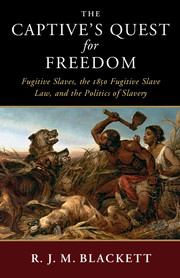 The Captive's Quest for Freedom
The Captive's Quest for Freedom 10 - Massachusetts
from PART II - FREEDOM'S FIRES BURN
Published online by Cambridge University Press: 19 January 2018
Summary
Not long after their arrival in Pennsylvania, during the 1848 Christmas holidays, William and Ellen Craft were advised to move to the safer environs of Boston. They had only recently escaped slavery from Macon, Georgia. Ellen was owned by Eliza, to whom she was given as a child by her father at the time of her wedding to Robert Collins in 1837. In one of those ironies of slavery, Eliza's father, it was generally believed, was also the father of Ellen. Collins, a “Whig Unionist,” was a leading figure in the rapidly growing city's economy and politics. He and Elam Alexander had won the contract to build a thirty-mile stretch of railroad from Macon to Oconee in 1840. Three years later, the line was extending, linking Macon to the Atlantic coast at Savannah. At the time of his death in 1861, Collins owned 102 slaves valued at $438,000; his landholdings included 1,200 acres in Macon, 5,390 acres “in joint account” in other parts of the state, and 23,343 acres in “Pine and Swamp land.” In comparison, William's owner, Ira H. Taylor, was listed in the census as a farmer of few means.
Although they were living as husband and wife since 1846, William and Ellen took the conscious decision not to have children while they were enslaved. Over the next two years, William later recalled, they “prayed and toiled” until an ingenious plan of escape materialized. On the day of their escape, Ellen, visibly white, was dressed as a slave master traveling to Philadelphia for treatment for a rheumatic complaint; William accompanied her as a valet. Since Ellen could not write, her right arm was placed in a sling to dissuade officials from asking her to sign documents acknowledging ownership of her slave, as was required by law. William also wrapped a poultice on her face, hoping to limit conversations with strangers. Silence, they calculated, increased their chances of success. In yet another irony, they traveled on the first leg of their escape to Savannah on the line built by Robert Collins. From Savannah the pair took a series of boats, trains, and coaches, first to Charleston, then Wilmington, North Carolina, Richmond, Washington, DC, and Baltimore before crossing into Pennsylvania. They covered the thousand miles from Macon to Philadelphia in just four days. Their dramatic escape became an instant sensation among abolitionists.
- Type
- Chapter
- Information
- The Captive's Quest for FreedomFugitive Slaves, the 1850 Fugitive Slave Law, and the Politics of Slavery, pp. 396 - 440Publisher: Cambridge University PressPrint publication year: 2018


